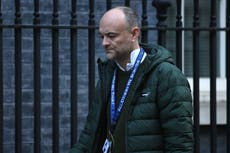The bust-up within Downing Street is thrilling drama – but what does it mean for policy?
Is this the last stand for Vote Leave? Likely not, but there will be consequences for all involved

Your support helps us to tell the story
From reproductive rights to climate change to Big Tech, The Independent is on the ground when the story is developing. Whether it's investigating the financials of Elon Musk's pro-Trump PAC or producing our latest documentary, 'The A Word', which shines a light on the American women fighting for reproductive rights, we know how important it is to parse out the facts from the messaging.
At such a critical moment in US history, we need reporters on the ground. Your donation allows us to keep sending journalists to speak to both sides of the story.
The Independent is trusted by Americans across the entire political spectrum. And unlike many other quality news outlets, we choose not to lock Americans out of our reporting and analysis with paywalls. We believe quality journalism should be available to everyone, paid for by those who can afford it.
Your support makes all the difference.Why should most people care that someone they hadn’t heard of has resigned from a job in No 10? It is all very interesting that Carrie Symonds, the prime minister’s fiancee, and Dominic Cummings, his chief adviser, appear to be at odds over something, but is it just a personality clash, or does it matter?
It probably does matter, a little. The resignation of Lee Cain, Boris Johnson’s communications director, has been written up as a blow for the Vote Leave gang. Cain is one of many political advisers in Downing Street who forged bonds of loyalty with Cummings in the EU referendum campaign.
But does his departure have any implications for the second stage of Brexit, the EU trade deal that has to be sorted out in the next few days? I don’t think so: that is a decision Johnson will take, advised by David Frost, his chief negotiator.
No doubt Nigel Farage will condemn any compromises Johnson makes in order to secure a deal, but most of the Vote Leave team have no time for Farage – they kept him at arm’s length during the referendum campaign, after all – and they expect a pragmatic deal to be done.
Cain’s departure might have more implications for coronavirus policy. Euroscepticism and lockdown-scepticism seem to go together. (Farage is one of the striking examples of this: at the beginning of the epidemic in March, he was urging the government to impose more restrictions on people; now he is setting up a new party to oppose lockdowns.) One of the surprising features of the Johnson No 10, however, is that Cummings tends to be on the pro-lockdown side of the argument.
When the “Covid quad” of ministers met on 30 October and decided, in effect, to order a second lockdown, we know that Matt Hancock and Michael Gove argued for it and that Rishi Sunak didn’t disagree. Another significant influence on the prime minister was Cummings.
Many Conservative MPs feel that Johnson was hustled by Hancock and Gove, and by Sir Patrick Vallance and Chris Whitty, the scientific and medical advisers, into the decision. But with Sunak offering no resistance and Cummings also in favour, it is hard to see how the prime minister could have resisted.
The bust-up over Cain’s promotion-that-wasn’t seems likely to dilute Cummings’s influence. We don’t know who will be chief of staff, or even whether Johnson will carry on without bestowing the formal title on anyone, but without Cain and with Allegra Stratton, the prime minister’s new on-screen spokesperson, the balance of power will shift.
The strange thing is that it was Cain’s idea to have a spokesperson hold daily televised briefings in the style of the White House, a move that was likely to diminish his role as head of communications – not least because such a spokesperson was bound to insist, as Stratton did, on being answerable directly to Johnson.
The main implication of that shift, which is of great interest to journalists, although less so to the wider public, is that Stratton wants to end the confrontational attitude to the media – a way of thinking ingrained in Vote Leavers in their long war against journalists who are, as individuals, mostly Remainers.
That shift could also have an effect on policy, because this approach to the media goes hand in hand with a contempt for most Conservative MPs. One of the reasons for Symonds’s opposition to Cain as chief of staff, it has been reported, is that she thought, as a former party press officer, that it would be bad for No 10’s relations with MPs. MPs always complain that No 10 doesn’t pay enough attention to them, but sometimes relations are worse than at other times, and since parliament resumed sitting in September they have been terrible. Hence the big vote against the government over the lockdown regulations last week, with Johnson losing a lot of Brexiteer and red-wall MPs who ought to be his strongest supporters.
MPs always complain too about high-handed advisers around the prime minister, but since his Barnard Castle adventure, Cummings has been particularly unpopular with the people on whose votes Johnson’s government depends.
If Cummings is weakened by the departure of Cain, though, it is likely to strengthen the hand of those who think the lockdown was premature, or an overreaction. If it means Johnson is forced to listen to his MPs more, that will increase the pressure to ease the lockdown the moment the case numbers turn – and to open up the economy as the dash to mass vaccination begins.
It looks like a soap opera, but it could have consequences.




Join our commenting forum
Join thought-provoking conversations, follow other Independent readers and see their replies
Comments